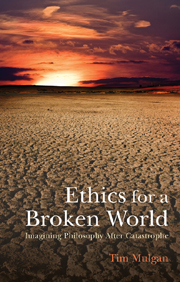Book contents
- Frontmatter
- Contents
- Acknowledgements
- Preface: Imagining a broken world
- Introductory lecture: Philosophy in the age of affluence
- Part I Rights
- Part II Utilitarianism
- Lecture 6 Act utilitarianism
- Lecture 7 Rule utilitarianism
- Lecture 8 Well-being and value
- Lecture 9 Mill on liberty
- Lecture 10 Utilitarianism and future people
- Lecture 11 Uilitarianism in a broken world
- Part III The social contract
- Part IV Democracy
- Reading list
- Bibliography
- Index
Lecture 11 - Uilitarianism in a broken world
from Part II - Utilitarianism
- Frontmatter
- Contents
- Acknowledgements
- Preface: Imagining a broken world
- Introductory lecture: Philosophy in the age of affluence
- Part I Rights
- Part II Utilitarianism
- Lecture 6 Act utilitarianism
- Lecture 7 Rule utilitarianism
- Lecture 8 Well-being and value
- Lecture 9 Mill on liberty
- Lecture 10 Utilitarianism and future people
- Lecture 11 Uilitarianism in a broken world
- Part III The social contract
- Part IV Democracy
- Reading list
- Bibliography
- Index
Summary
teacher: Today, instead of a regular lecture, three graduate students who are studying a. uent utilitarianism will present a short philosophical debate. Each is playing a role, and should not be held accountable for the views they express. (You will recognize the parti cipants, but I shall anonymize them for the transcript.) Let me set the scene. Imagine three inhabitants of our broken world, each a proponent of one utilitarian traditi on. act favours act uti litarianism, hedonism and total utilitarianism. rule favours moderate rule utilitarianism. institution concentrates on the utilitarian evaluation of institutions. They are familiar with debates from the affluent world, but they focus today on the applicati on of utilitarianism to our broken world. The debate opens with rule posing a challenge for act.
rule: I admire the simplicity and directness of your theory. But isn't it extremely demanding in our broken world?
act: Yes. Act utilitarianism is extremely demanding. But that is old news. It was extremely demanding even in the most favourable of human situations. Every agent, on every occasion, must perform the one action that best promotes aggregate human happiness. This demand remains constant. No one who accepted act utilitarianism in the affluent world would have any reason to abandon it now. Quite the reverse. Act utilitarianism is more plausible now.
- Type
- Chapter
- Information
- Ethics for a Broken WorldImagining Philosophy after Catastrophe, pp. 133 - 146Publisher: Acumen PublishingPrint publication year: 2011



